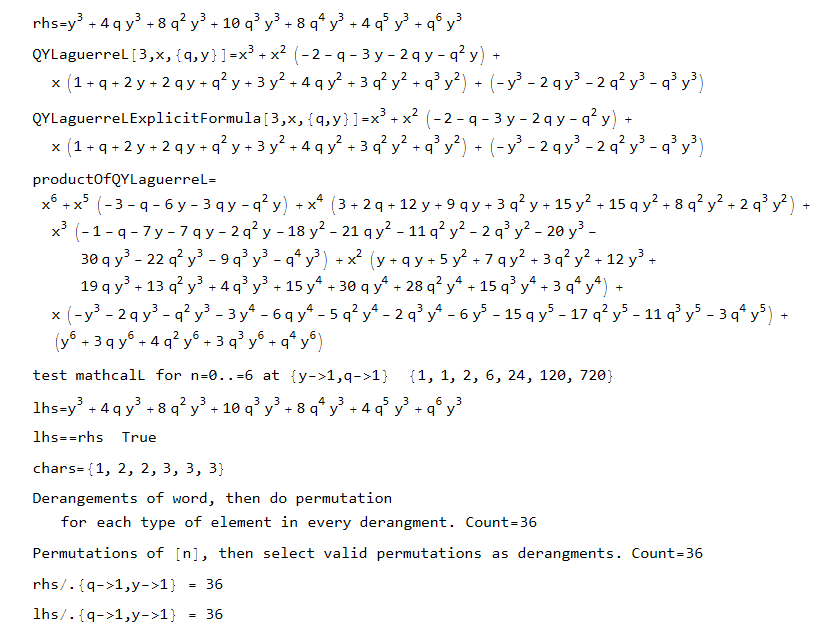Use $\textbf{Theorem 1.1}$ from [1],
The linearization coefficients of q-Laguerre polynomials are given by
$$
\mathcal{L}\left(L_{n_1}(x ; q, y) \cdots L_{n_k}(x ; q, y)\right)=\sum_{\sigma \in \mathcal{D}\left(n_1, \ldots, n_k\right)} y^{\operatorname{wex}(\sigma)} q^{\operatorname{cross}(\sigma)}
$$
The below code is correct.
for case $(n_1,\cdots,n_k)=(1,2,3) \scriptstyle{\quad\text{or permutations of (1,2,3)}}$
$$
\text{LHS}=y^3 q^6+4 y^3 q^5+8 y^3 q^4+10 y^3 q^3+8 y^3 q^2+4 y^3 q+y^3=\text{RHS}
$$
for case $(n_1,\cdots,n_k)=(2,3,4) \scriptstyle{\quad\text{or permutations of (2,3,4)}}$
$$
\text{LHS}=y^5 q^{16}+8 y^5 q^{15}+y^4 q^{15}+33 y^5 q^{14}+8 y^4 q^{14}+93 y^5 q^{13}+33 y^4 q^{13}+199 y^5 q^{12}+93 y^4 q^{12}+341 y^5 q^{11}+199 y^4 q^{11}+482 y^5 q^{10}+341 y^4 q^{10}+571 y^5 q^9+482 y^4 q^9+571 y^5 q^8+571 y^4 q^8+482 y^5 q^7+571 y^4 q^7+341 y^5 q^6+482 y^4 q^6+199 y^5 q^5+341 y^4 q^5+93 y^5 q^4+199 y^4 q^4+33 y^5 q^3+93 y^4 q^3+8 y^5 q^2+33 y^4 q^2+y^5 q+8 y^4 q+y^4
=\text{RHS}
$$

Clear["Global`*"];
nkVec = {1, 2, 3};
n = Total[nkVec];
k = Length[nkVec];
chars = Permutations[Range[n]];
judgeFunc[perm_] :=
Module[{nSums, i, j}, nSums = Prepend[Accumulate[nkVec], 0];(*n_0=0,
cumulative sums*)
For[i = 1, i <= n, i++,
For[j = 1, j <= k, j++,
If[nSums[[j]] + 1 <= i <= nSums[[j + 1]] &&
nSums[[j]] + 1 <= perm[[i]] <= nSums[[j + 1]],
Return[False]];];];
True];
derangements = Select[chars, judgeFunc];
wex[p_] := With[{n = Length@p}, Sum[Boole[p[[i]] >= i], {i, 1, n}]];
ov[p_] :=
With[{n = Length@p},
Sum[Boole@
Or[i < j <= p[[i]] < p[[j]], p[[j]] < p[[i]] < j < i], {i, 1,
n}, {j, 1, n}]];
cross[p_] := ov[p];
rhs = Sum[y^wex[\[Sigma]]*q^cross[\[Sigma]], {\[Sigma], derangements}];
Print["rhs=", rhs];
QInteger[n_Integer, q_ : 1] := QBinomial[n, 1, q];
OrderedForm[x_] :=
HoldForm[+##] & @@ (x^#1[[1]] #2 & @@@ CoefficientRules[#, x]) &;
QYLaguerreLExplicitFormula[n_, x_, {q_, y_}] :=
Sum[(-1)^(n - k)*QFactorial[n, q]/QFactorial[k, q]*
QBinomial[n, k, q]*q^(k*(k - n))*y^(n - k)*
Product[(x - (1 - y*q^(-j))*QInteger[j, q]), {j, 0, k - 1}], {k,
0, n}];
QYLaguerreL[0, x, {q_, y_}] := 1;
QYLaguerreL[1, x, {q_, y_}] := x - y;
QYLaguerreL[2, x, {q_, y_}] := x^2 - (y*q + 2 y + 1) x + y^2 + y^2*q;
QYLaguerreL[n_,
x_, {q_, y_}] := (x - y*QInteger[n, q] - QInteger[n - 1, q])*
QYLaguerreL[n - 1, x, {q, y}] -
y*QInteger[n - 1, q]^2*QYLaguerreL[n - 2, x, {q, y}];
Print["QYLaguerreL[3,x,{q,y}]=",
QYLaguerreL[3, x, {q, y}] // FunctionExpand // FullSimplify //
Expand // OrderedForm[x]];
Print["QYLaguerreLExplicitFormula[3,x,{q,y}]=",
QYLaguerreLExplicitFormula[3, x, {q, y}] // FunctionExpand //
FullSimplify // Expand // OrderedForm[x]];
productOfQYLaguerreL =
Product[QYLaguerreL[nk, x, {q, y}], {nk, nkVec}] // FunctionExpand //
FullSimplify // Expand;
Print["productOfQYLaguerreL=", productOfQYLaguerreL // OrderedForm[x]];
mathcalL[n_] :=
mathcalL[n] = Sum[y^wex[p]*q^cross[p], {p, Permutations[Range[n]]}];
Print["test mathcalL for n=0..=6 at {y->1,q->1} ",
mathcalL /@ Range[0, 6] /. {y -> 1, q -> 1}];
lhs = Module[{coeffs = CoefficientList[productOfQYLaguerreL, x]},
Sum[coeffs[[i]]*mathcalL[i - 1], {i, 1, Length@coeffs}] //
FullSimplify // Expand // FullSimplify // Expand];
Print["lhs=", lhs];
Print["lhs==rhs ", lhs == rhs];
chars = Apply[Join,
Table[ConstantArray[i, nkVec[[i]]], {i, Length@nkVec}]];
Print["chars=", chars];
Print["Derangements of word, then do permutation for each type of \
element in every derangment. Count=",
Count[Permutations[chars], x_ /; Inner[UnsameQ, x, chars, And]]*
Product[nk!, {nk, nkVec}]];
Print["Permutations of [n], then select valid permutations as \
derangments. Count=", derangements // Length];
Print["rhs/.{q->1,y->1} = ", rhs /. {q -> 1, y -> 1}];
Print["lhs/.{q->1,y->1} = ", lhs /. {q -> 1, y -> 1}];
[1] ON LINEARIZATION COEFFICIENTS OF q-LAGUERRE POLYNOMIALS

